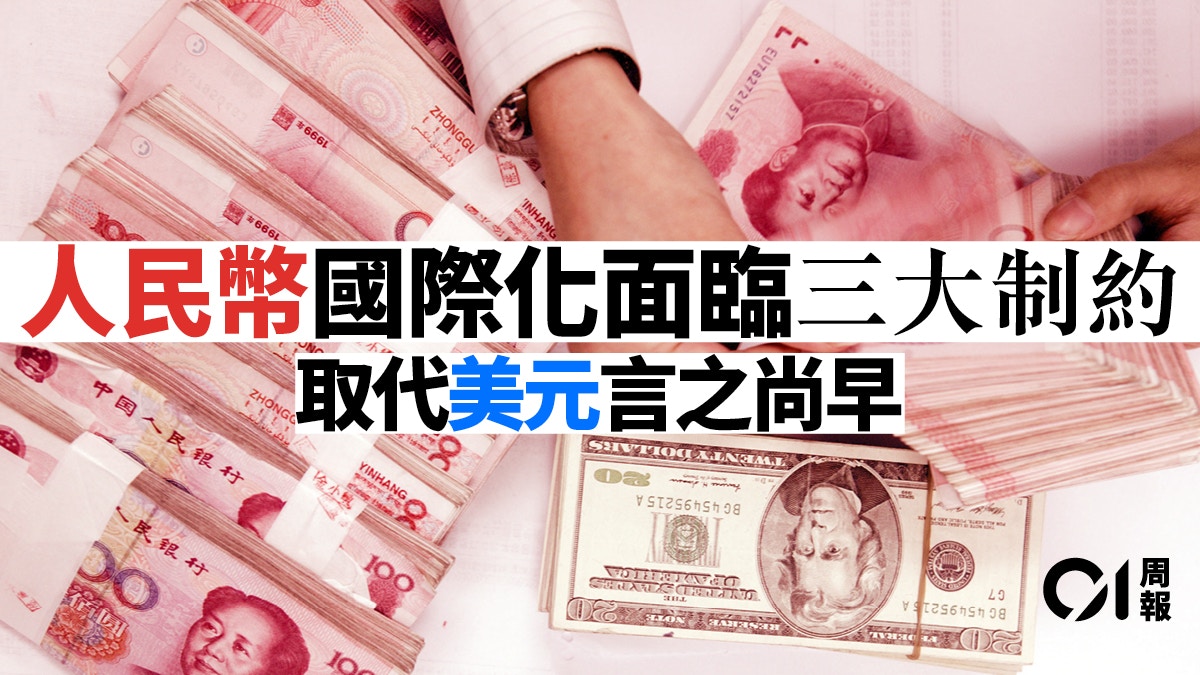Since the outbreak of the Russian-Ukrainian war, the trend of RMB internationalization has attracted much attention.
On the one hand, the unprecedented economic and financial sanctions imposed by the West on Russia have once again demonstrated the dominance of the US dollar in the global economic and trade network, which is bound to make Beijing more aware of the importance of RMB internationalization; on the other hand, the sanctions have in turn impacted the US dollar order. , the trend of diversification of reserve assets in some countries and regions seems inevitable, and one of the options is the renminbi.
However, it is still unknown to what extent this geopolitical event and its impact will promote the internationalization of the RMB. Before the liberalization of capital accounts and foreign exchange controls, it is difficult for the RMB to make a qualitative leap in internationalization, let alone to replace the U.S. dollar.
U.S. dollar dominance won't change anytime soon
Contrary to most people's expectations, Russia struck Ukraine in a flash at the end of February, and the ensuing Western sanctions also caused a worldwide uproar - the United States and its allies not only excluded some Russian banks from the Society for Worldwide Interbank Financial Telecommunication (SWIFT) ) and froze nearly half of the Russian central bank's foreign exchange reserve assets.
The shock to the international monetary and financial system from this black swan event is obvious.
Zoltan Pozsar, an investment strategist at Credit Suisse, who worked for the U.S. Treasury Department and the Federal Reserve Bank of New York, even bluntly stated that the war has overturned the dominance of sovereign credit currencies and may give birth to a new monetary system, Bretton Woods 3.0.
He pointed out that the basis of 2.0 is "inside money" (inside money), that is, pure fiat currencies led by the US dollar, which collapsed when the assets of the Russian central bank were frozen; and "outside money" (outside money), that is, gold and other Assets such as commodities will outperform "intrinsic money".
In Liao Minxiong's view, it is difficult to deduce the question of who will replace the US dollar as the global reserve currency.
(provided by respondents)
Liao Minxiong, president of the Asia-Pacific region of TS Lombard, an independent macro research institute, explained in an interview with Hong Kong 01 that the core view of Bretton Woods 3.0 is the return of commodities or the physical standard, "In fact, as early as the beginning of the last century or even earlier, there have been people A currency standard based on a basket of commodities (including gold) has been proposed, but it has always had some drawbacks, such as operational difficulties and short-term (especially in times of crisis) inflexibility.”
In Liao Minxiong's view, it is difficult to deduce the question of who will replace the US dollar as the global reserve currency. At this stage, we are still in a world dominated by the US dollar.
"In addition to this sanctions, trade deglobalization, decarbonization, and China's long-term rebalancing may change the world's economic landscape for a long time, thereby affecting the dominance of the dollar, but it is a long time," he said. It cannot happen suddenly.”
RMB may benefit from diversification of reserves
However, it is certain that such sanctions in disguise will further diversify the foreign exchange reserve structure of central banks, and the renminbi will be one of the options.
For example, according to Bloomberg's report on April 20, starting this year, Israel's foreign exchange reserves will be composed of the original US dollar, euro and British pound triangle combination, and the Canadian dollar, Australian dollar, Japanese yen and Chinese yuan will be added for the first time.
In order to match the biggest adjustment and change in the past decade, the Bank of Israel will reduce the proportion of the dollar and the euro.
A working report released by the International Monetary Fund (IMF) on March 24 also showed that since the beginning of this century, the proportion of the US dollar in the foreign exchange reserves of global central banks has dropped from 71% to 59% in 2021. .
In the report, "The Stealth Erosion of Dollar Dominance," the authors point out that the decline in the dollar's share reflects the diversification of central banks' reserve assets, and these lost shares mainly include Two destinations: "A quarter went to China's renminbi; the remaining three-quarters went to currencies of smaller countries that used to have an insignificant reserve role."
The internationalization of RMB started in 2009. It has experienced a process of starting from nothing for more than ten years, and now it has initially assumed the characteristics of an international currency.
(Getty Images)
According to the latest "Currency Composition of Official Foreign Exchange Reserves" (COFER) released by the IMF, in the fourth quarter of 2021, the RMB accounted for 2.79% of global foreign exchange reserves, the highest since the IMF began to publish data on RMB reserve assets in 2016. level.
In addition, "the trade war, the new crown epidemic, and the war all point in one direction - deglobalization, shortening the global industrial chain, and increasing bilateral trade. In the complex global industrial chain, the dollar or the euro is of course still the same. It is the dominant settlement currency, but as long as China continues to improve in terms of high value-added exports, regions with increased bilateral trade with China will also consider settlement in RMB more, thereby increasing the allocation of RMB reserves, such as Russia or some Latin America Country." Liao Minxiong added.
Conditions for becoming a major reserve currency
But does this mean that the internationalization of the RMB will usher in a major breakthrough?
the answer is negative.
The internationalization of the RMB started in 2009, and has experienced a process from scratch for more than ten years. At present, it has the characteristics of an international currency, but there is still a considerable gap compared with the major reserve currencies.
Taking the US dollar as an example, although its share of global foreign exchange reserves has declined in the past two decades, its share of about 59% is still far behind the euro (20.64%), the yen (5.57%), and the pound (4.78%). ), and the RMB (2.79%) is even worse.
Moreover, the dollar is also thriving in international payments, trade settlements, debt issuance, international financing, and financial transactions.
The decline in the dollar's share of global foreign exchange reserves reflects the diversification of central banks' reserve assets.
(Reuters)
Liao Minxiong explained that as a reserve currency issuer, it must be willing to continue to have huge current account deficits in order to meet the currency needs of other countries in the world, and currently only the United States can play this role.
As of 2021, the U.S. current account deficit is equal to the combined surpluses of Germany, China, Japan, South Korea and the Netherlands, with excess earnings from the latter flowing to the U.S.
In addition to the sound capital market in the United States, the protection of intellectual property rights, the high and safe returns provided by bonds, and the great economic flexibility, one of the most important reasons for this situation is the U.S. dollar's status as a reserve currency.
"Arguably, the dollar's role as the dominant reserve currency is both the cause and the consequence of the persistently large U.S. current account deficit."
In contrast, China's manufacturing industry is developed, but domestic demand is weak, and its economy has long been export-oriented. It is a country with a current account surplus. In recent years, the decline in household balance sheets and the property market has added a layer of fog to domestic demand. Naturally, it is difficult to bear the burden of other countries. Large demand for reserve currencies.
"Only when Chinese demand (rather than investment demand) plays a bigger role in driving the world, can the demand for the renminbi from the rest of the world be fundamentally met," said Liao Minxiong.
The opening of the capital account still needs to be broken through
Secondly, to become a reserve currency, it needs to meet the needs of international investors to allocate and manage RMB assets. Therefore, a mature local financial market is very important for attracting foreign investment and currency internationalization, but the current size of China's capital market is only one-third of that of the United States. First, there is still a considerable gap in the liquidity and depth of the market.
Regarding how to increase the depth of the market and improve the RMB investment tools in the future, Liao Minxiong said that in recent years, the interconnection mechanism of stocks and bonds between land and Hong Kong has played a good role in promoting; , he believes that it is necessary to improve the liquidity of the secondary market, through the development of the repurchase market, so that investors can go long and short bonds in the repo market; at the same time, it is also necessary to further develop derivatives and other hedging tools, and to a wider range of Participants are open.
A mature local financial market is essential for attracting foreign investment and currency internationalization.
(Xinhua News Agency)
Finally, China has yet to see a major breakthrough on the issue of RMB capital account convertibility...
For details, please read the 315th issue of "Hong Kong 01" Electronic Weekly Newsletter (May 3, 2022) "It
is too early to say that there is no obvious breakthrough in the internationalization of the RMB to replace the US dollar
".
Click here
to try out the weekly e-newsletter for more in-depth reports.






